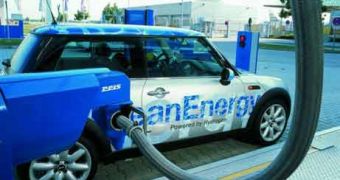A breakthrough has been made in the field of alternative fuels. A new method can generate hydrogen from water with the help of an aluminum alloy, which can be used in fuel cells or internal combustion engines.
It could successfully replace gasoline in conventional engines and overcomes the biggest challenge in today's hydrogen cars: how to store and transport hydrogen.
Jerry Woodall, a professor of electrical and computer engineering at Purdue, invented the process that could make hydrogen a truly reliable alternative fuel.
The breakthrough comes from the fact that "The hydrogen is generated on demand, so you only produce as much as you need when you need it," according to Woodall, and this means it could be used to power internal combustion engines in various applications, including portable emergency generators, lawn mowers and chain saws.
The possibility of replacing gasoline for normal cars, without too many expensive modifications is also a huge advantage, not only for the customers, but also for the car manufacturers, who won't need separate production lines for hydrogen and conventional models.
How does it work? When water is added to pellets made of the aluminum and gallium alloy, hydrogen is generated spontaneously by splitting water molecules, and it can be directly fed to the engine, without the need of previous storage tanks for the hydrogen itself, which usually needs to be liquefied, takes up a lot of space and is also flammable.
"When water is added to the pellets, the aluminum in the solid alloy reacts because it has a strong attraction to the oxygen in the water," Woodall said. "No toxic fumes are produced," Woodall said. "It's important to note that the gallium doesn't react, so it doesn't get used up and can be recycled over and over again. The reason this is so important is because gallium is currently a lot more expensive than aluminum. Hopefully, if this process is widely adopted, the gallium industry will respond by producing large quantities of the low-grade gallium required for our process. Currently, nearly all gallium is of high purity and used almost exclusively by the semiconductor industry."
This technology not only makes it possible to use hydrogen instead of gasoline to run internal combustion engines without the need for previous storage, but it's also incredible cheap: "Right now it costs more than $1 a pound to buy aluminum, and, at that price, you can't deliver a product at the equivalent of $3 per gallon of gasoline," as Woodall said.

 14 DAY TRIAL //
14 DAY TRIAL //